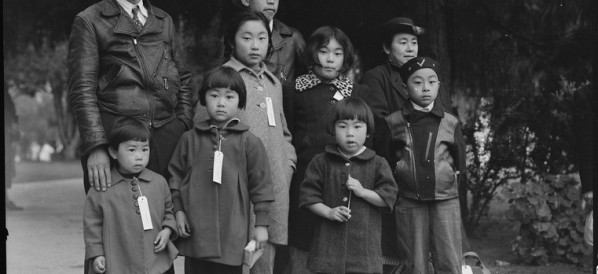 10 Terms
10 TermsHome > Terms > English (EN) > China
China
For the US, China has been a distant land that may be mysterious, enchanting or threatening. While the US, unlike Europe, occupied no protectorate in China during the late nineteenth and early twentieth century China provided markets for both business people and missionaries. On the other hand, the Chinese have harbored strong suspicions about Americans, balancing admiration of some aspects of techno-modernity by concerns about social and cultural limits. Despite Chinese immigration to the US and growing American knowledge of China, suspicions as well as competitions often divide the nations.
The Second World War was a watershed in US-China relations. Fighting the Japanese as allies, the US recognized Chinese citizenship at home and, in Frank Capra’s Battle of China, touted the nation’s commitment to democracy and peace. Yet, seeds of difference were already present that became climactic in the triumph of the Chinese Communist Party in 1949. This change reverberated in the Cold War US around claims about “who lost China” and opposition to Chinese communist intervention, played out in Korea (and, later, Vietnam). American commitments to nationalist forces who had fled to Taiwan nearly led to war in 1955 and 1958, and remain a source of conflict today Moreover, American—Chinese relations have been triangulated by both states in terms of other ties and conflicts with the Soviet Union, Japan and India.
Nonetheless, an important shift in US policy came under Richard Nixon, who had baited the People’s Republic of China for much of his career. Building on sporadic ongoing diplomatic talks and “ping-pong diplomacy” he sent Secretary of State Henry Kissinger to Beijing in 1971 for secret talks, followed by Nixon’s dramatic state visit in 1972. Recognition of “the mainland,” as many Americans refer to it, had repercussions for Taiwan/the People’s Republic of China (then a totalitarian regime with strong lobbyists in Washington). Loss of its UN seat and wariness over American commitments and PRC intentions have complicated Taiwan, where America now practices a policy of “strategic ambiguity.” Sino-American contact grew in the 1970s and 1980s not only between people (journalists, scholars, tourists) and ideologies, but also between markets. Yet, in 1989, the US and China again reached point of decision when television broadcasted the brutal repression of students in Tiananmen Square, whose Goddess of Liberty recalled the American Statue of Liberty Ambivalence on the part of both the US and mainland China has marked subsequent relations. Commercial ties have driven American corporate and political campaigns for “permanent normal trade relations” and entry into the World Tade Organization. Yet, human rights activists (including many concerned by religion), labor organizers and right-wing isolationists decry this rapprochement or demand concessions the Chinese are unwilling to give. This led to bitter confrontations (including those within the Democratic Party) before Congress approved PNTR status in May 2000. Others asked why China should be given this status and Cuba embargoed. At the same time, Chinese courting of American support betrays a wariness of American morals as well as policies.
Both misunderstanding and necessity will undoubtedly continue into the twenty-first century despite increasing exchange and communication among their citizens.
- Part of Speech: noun
- Synonym(s):
- Blossary:
- Industry/Domain: Culture
- Category: American culture
- Company: Routledge
- Product:
- Acronym-Abbreviation:
Other Languages:
Member comments
Terms in the News
Billy Morgan
Sports; Snowboarding
The British snowboarder Billy Morgan has landed the sport’s first ever 1800 quadruple cork. The rider, who represented Great Britain in the 2014 Winter Olympics in Sochi, was in Livigno, Italy, when he achieved the man-oeuvre. It involves flipping four times, while body also spins with five complete rotations on a sideways or downward-facing axis. The trick ...
Marzieh Afkham
Broadcasting & receiving; News
Marzieh Afkham, who is the country’s first foreign ministry spokeswoman, will head a mission in east Asia, the state news agency reported. It is not clear to which country she will be posted as her appointment has yet to be announced officially. Afkham will only be the second female ambassador Iran has had. Under the last shah’s rule, Mehrangiz Dolatshahi, a ...
Weekly Packet
Language; Online services; Slang; Internet
Weekly Packet or "Paquete Semanal" as it is known in Cuba is a term used by Cubans to describe the information that is gathered from the internet outside of Cuba and saved onto hard drives to be transported into Cuba itself. Weekly Packets are then sold to Cuban's without internet access, allowing them to obtain information just days - and sometimes hours - after it ...
Asian Infrastructure Investment Bank (AIIB)
Banking; Investment banking
The Asian Infrastructure Investment Bank (AIIB) is an international financial institution established to address the need in Asia for infrastructure development. According to the Asian Development Bank, Asia needs $800 billion each year for roads, ports, power plants or other infrastructure projects before 2020. Originally proposed by China in 2013, a signing ...
Spartan
Online services; Internet
Spartan is the codename given to the new Microsoft Windows 10 browser that will replace Microsoft Windows Internet Explorer. The new browser will be built from the ground up and disregard any code from the IE platform. It has a new rendering engine that is built to be compatible with how the web is written today. The name Spartan is named after the ...
Featured Terms
internment
Another term for confinement. It's the forced relocation of a specific group of individuals, usually based on ethnicities, to a detention center or ...
Contributor
Featured blossaries
vhanedelgado
0
Terms
15
Blossaries
7
Followers
World’s Best Winter Festivals
 4 Terms
4 TermsBrowers Terms By Category
- Prevention & protection(6450)
- Fire fighting(286)
Fire safety(6736) Terms
- Marketing communications(549)
- Online advertising(216)
- Billboard advertising(152)
- Television advertising(72)
- Radio advertising(57)
- New media advertising(40)
Advertising(1107) Terms
- General accounting(956)
- Auditing(714)
- Tax(314)
- Payroll(302)
- Property(1)
Accounting(2287) Terms
- Wireless networking(199)
- Modems(93)
- Firewall & VPN(91)
- Networking storage(39)
- Routers(3)
- Network switches(2)




